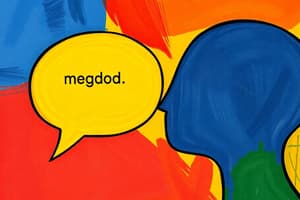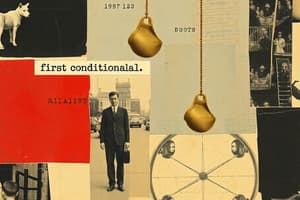Podcast
Questions and Answers
Which modal verb phrase expresses strong obligation?
Which modal verb phrase expresses strong obligation?
- You may go to the party.
- You could help him if you wanted.
- You can take the day off tomorrow.
- You must stop when the traffic light turns red. (correct)
What is the correct form for a first conditional sentence?
What is the correct form for a first conditional sentence?
- If she orders dessert, I will order too. (correct)
- If it rains, I would stay home.
- If you heat ice, it melts.
- If she had understood, she will pass the test.
Which conditional is used for expressing past regret?
Which conditional is used for expressing past regret?
- Third conditional (correct)
- Second conditional
- First conditional
- Zero conditional
In which communicative style is language the most formal?
In which communicative style is language the most formal?
Which sentence exemplifies the structure of the second conditional?
Which sentence exemplifies the structure of the second conditional?
What structure represents the zero conditional?
What structure represents the zero conditional?
Which modal verb phrase indicates permission?
Which modal verb phrase indicates permission?
Which of the following sentences uses the third conditional structure correctly?
Which of the following sentences uses the third conditional structure correctly?
Flashcards
Modal Verbs
Modal Verbs
Auxiliary verbs showing permission, obligation, or possibility
Zero Conditional
Zero Conditional
Describes always-true situations
First Conditional
First Conditional
Likely outcome based on a condition
Second Conditional
Second Conditional
Signup and view all the flashcards
Third Conditional
Third Conditional
Signup and view all the flashcards
Conditional Sentences
Conditional Sentences
Signup and view all the flashcards
Frozen Style
Frozen Style
Signup and view all the flashcards
Casual Style
Casual Style
Signup and view all the flashcards
Study Notes
Modal Verbs
- Modal verbs function as auxiliary or helping verbs to convey permission, obligation, and prohibition.
- Strong obligation example: "You must stop when the traffic light turns red."
- Expressing possibility: "Smoking can cause cancer."
- Ability in the past illustrated by: "When I was younger, I could run fast."
- Future possibility indicated by: "It may rain tomorrow!"
- Requesting permission with: "Can I have a cookie?"
Conditional Sentences
- Conditional sentences express speculation about potential, past possibilities, or wishes.
- Structure: If clause (dependent) + Main clause (independent).
Zero Conditional
- Used for statements that are always true.
- Structure: If + simple present + simple present.
- Example: "If you heat ice, it melts."
- Example: "If the door is open, you can come in."
First Conditional
- Used to predict a likely or possible outcome based on a specific condition.
- Structure: If + simple present + simple future (will + verb).
- Example: "If she orders dessert, I will order too."
- Example: "She will know the answer if she tries to understand."
Second Conditional
- Used for unlikely or impossible outcomes.
- Structure: If + simple past + would + verb.
- Example: "If I were rich, I would help the needy."
- Example: "She would be so happy if she marries him."
- Example: "If I won the lottery, I would travel around the world."
Third Conditional
- Expresses past regrets and hypothetical situations.
- Structure: If + past perfect (had + past participle) + would have + past participle.
- Example: "If he had woken up early, he would have gone to school on time."
- Example: "I would have passed the exam if I had worked hard."
- Example: "Her father would have felt better if he had taken his medicines."
- Example: "If she had taken the earlier flight, she wouldn’t have missed the meeting."
- Example: "If I had met Susan last week, I would have given her the book."
Communicative Styles
- Refers to the level or formality inherent in a speaker's language usage.
Frozen Style
- The most formal communicative style, often ritualistic in nature.
Formal Style
- A more straightforward, one-way communication approach, typically used in professional settings.
Consultative Style
- Involves listener participation and feedback to enhance interaction.
Casual Style
- Informal communication typically exchanged between friends.
Intimate Style
- Characterized by private conversations, reflecting personal relationships.
Studying That Suits You
Use AI to generate personalized quizzes and flashcards to suit your learning preferences.




